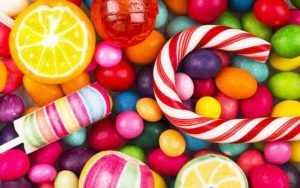 Most of the foods and drinks for sale at store checkout lanes are unhealthy. This includes supermarkets, grocery stores, dollar stores, drugstores, and specialty food stores. This shouldn't be a surprise to anyone.
Most of the foods and drinks for sale at store checkout lanes are unhealthy. This includes supermarkets, grocery stores, dollar stores, drugstores, and specialty food stores. This shouldn't be a surprise to anyone.
University of California researchers found that 70% of foods and drinks displayed in store checkout lanes to be unhealthy. And if the offerings are snack-sized, the number of unhealthy foods rises to 89%. Typical foods displayed at checkout lanes were candy (31%), gum (18%), sweetened beverages, salty snacks, mints, and sweets.
Why? Because food and beverage companies view checkout lanes as prime real estate for their goods, and pay money to the stores to place their products there. They count on people making impulse purchases of their products.
From Medical Xpress: Temptation at the checkout: 70% of food, drinks within arm's reach are unhealthy
We've all been there: waiting in line at a store checkout, surrounded by tempting snacks and drinks. Navigating the checkout lane in search of healthy options could be a challenge, according to researchers at the University of California, Davis, who found that 70% of foods and beverages at checkout are unhealthy.
For snack-sized options, an even higher proportion were unhealthy—89%.
A study published this month in the journal Current Developments in Nutrition suggests most food and beverage options at checkout consist of candy (31%), sugar-sweetened beverages (11%), salty snacks (9%) and sweets (6%).
Healthy items were far less common. Water represented 3% of food and beverage options, followed by nuts and seeds (2%), fruits and vegetables (1%), legumes (0.1%) and milk (0.02%).
Food and beverage companies consider the checkout lane to be prime real estate for their products, said Jennifer Falbe, associate professor with the Department of Human Ecology and lead author of the study. The checkout is the only place in a store where every customer must pass through, and it's known to contribute to impulse purchases, she said.
"The checkout lane has been designed this way through marketing agreements in which food and beverage companies pay stores to place their products—which are mostly unhealthy—at checkout," Falbe said.
Researchers analyzed the checkout lanes in 102 food stores in Davis, Sacramento, Oakland and Berkeley. Stores included supermarkets, grocery stores, specialty food stores, drugstores, dollar stores and mass merchandisers.
The evaluation was conducted in February 2021, right before an ordinance in the city of Berkeley went into effect requiring large food stores to offer more nutritious offerings at the checkout. Berkeley became the first city in the U.S. to implement a healthy checkout policy.
Falbe said Berkeley's policy is consistent with federal dietary guidelines that emphasize consuming nutrient-dense foods such as fruits, vegetables, whole grains, nuts and seeds and cutting back on sodium and added sugars.
The researchers found that the percentage of food and beverage options that met healthy checkout standards was highest in chain specialty food stores, chain supermarkets and chain mass merchandisers. It was lowest in chain dollar stores and independent grocery stores, which are more common in disadvantaged neighborhoods.
